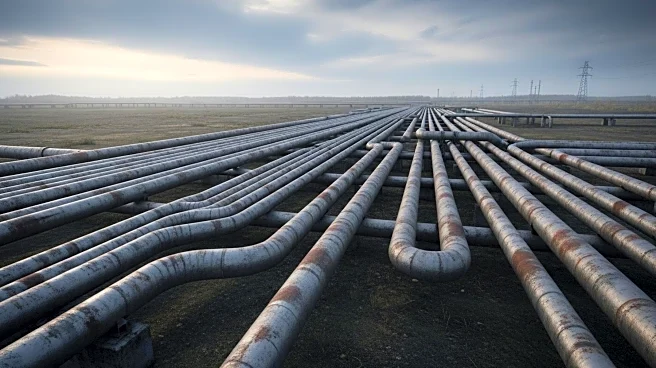What is the story about?
What's Happening?
Russian oil production is experiencing a significant decline due to a combination of global sanctions and the aging of its legacy production hubs. Historically, Russia has relied heavily on oil revenues, which constitute about a third of its general revenue and fund its war efforts in Ukraine. The sanctions imposed by the U.S. and EU have restricted Russia's access to essential Western technology and equipment needed for oil extraction, particularly in its shale reserves. The aging fields in Western Siberia and the Volga-Urals region are running low, forcing Russian oil companies to seek new sources of production. However, the lack of advanced technology and trained field crews, exacerbated by the diversion of manpower to the war effort, has hindered these efforts. As a result, Russian oil production is projected to decline significantly, potentially dropping over 20% by 2030.
Why It's Important?
The decline in Russian oil production has significant implications for global energy markets. Russia has been a major player in the oil industry, and its reduced output could lead to tighter global supply and increased oil prices. This situation is occurring at a time when global demand for oil is expected to rise, with estimates suggesting demand could reach between 103.4 million and 113 million barrels per day by 2030. The inability of Russia to maintain its production levels could create a gap in supply, affecting energy security and economic stability worldwide. Additionally, the sanctions highlight the geopolitical tensions and their impact on international trade and energy policies.
What's Next?
As Russian oil production continues to decline, the country may face increased economic pressure and challenges in funding its military operations. The global energy market will need to adjust to the reduced supply from Russia, potentially leading to increased investment in alternative energy sources or other oil-producing regions. Countries dependent on Russian oil may seek to diversify their energy sources to mitigate risks associated with supply disruptions. The situation also underscores the importance of technological advancements in the oil industry, as countries with access to cutting-edge technology may gain a competitive advantage in production efficiency.
Beyond the Headlines
The decline in Russian oil production due to sanctions raises ethical and legal questions about the use of economic measures to influence geopolitical outcomes. It also highlights the long-term shifts in energy production, as countries may increasingly turn to renewable energy sources to reduce dependency on oil. The situation could lead to a reevaluation of energy policies and strategies, emphasizing sustainability and energy independence. Furthermore, the impact on Russia's economy may have broader social implications, affecting employment and living standards in regions reliant on oil production.

















